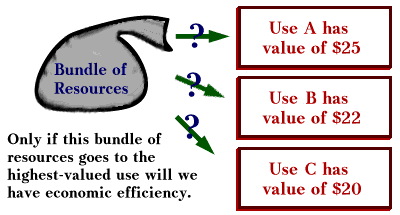Economic Efficiency in A Nutshell
Economists can get very technical when they discuss the topic of economic efficiency, and most of the rest of the reading selections in this unit are going to get technical. But the basic idea of economic efficiency is very simple and can be illustrated in a simple example.
Suppose that we have a bundle of resources (hours of labor, raw materials, machines, etc.) and that this bundle has three potential uses. In use A, it produces output that consumers value at $25; in use B, it produces output worth $22 to consumers; and in use C, it produces output worth $20 to consumers. The concept of economic efficiency says that these resources should be used to produce the output of use A because it has the highest value. If these resources are in fact used in A, the result is economically efficient. If they end up being used to produce either B or C, the economic system is not producing as much value as it could and the result is economically inefficient.

Furthermore, a market economy will tend to use the resources for use A. Because use A has the highest value to consumers, we expect that the producers of A should be able to bid the most for the resources. Normally, those who want to use it to produce C will only be willing to bid up to $20 for these resources, the producers of B will only be willing to bid up to $22, but the producers of A will be willing to bid up to $25. Hence, the market system has a tendency to shift resources to their highest-valued use.
However, there are a variety of circumstances under which that bundle of resources will not get used for A, but will be used for B or C. One way that can happen is for the government to tax, regulate, or subsidize so that the relative values that consumers put on these uses do not get reflected in the bidding for the resources. Economic inefficiency can also occur when markets for some reason do not properly transmit the valuations that consumers place on the products. When the market cannot get resources to use A, economists say that we have a case of market failure. There are a wide variety of cases in which market failure can happen, and examining them is an important part of microeconomics.
In a discussion of the prisoner's dilemma, we considered whether what was good for the individual was good for the group. The concept of economic efficiency makes this discussion more precise and specific. When the outcome of people's individual actions is economically efficient, what is good for the individual is good for the group. When the outcome is economically inefficient, then what is good for the individual is not the best for the group.
Now that we have a clear, intuitive understanding of what economic efficiency means and why we can expect markets to have a tendency to get us there, we can begin a more technical look at the topic by examining the three conditions needed for an economy to avoid unexploited value: production, exchange, and product-mix efficiency.
Copyright Robert Schenk